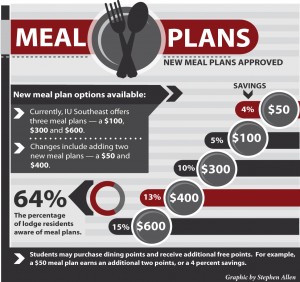 At IU Southeast, meal plans are optional for students. However, Lauren Smith, business junior, was used to paying a mandatory meal plan fee during her first two years at the University of Louisville.
At IU Southeast, meal plans are optional for students. However, Lauren Smith, business junior, was used to paying a mandatory meal plan fee during her first two years at the University of Louisville.
After transferring to IU Southeast in fall 2010, Smith said it was much nicer going to a campus where the meal plans were not mandatory.
“I just liked it because you can load up your card really easily on the IUS account, and then you have the option of eating off-campus,” she said. “At U of L you don’t have that option because they have so many fast food places already there.”
Dana Wavle, vice chancellor of Administrative Affairs, and Ruth Garvey Nix, vice chancellor of Student Affairs, formed a meal plan task force during the spring semester to make recommendations for new meal plans in the upcoming years.
Before the fall semester, IU Southeast offered three meal plans with savings for students — $100 with a 5 percent savings, $300 with a 10 percent savings and $600 with a 15 percent savings.
Now, two new additional meal plans have been added, involving a $50 meal plan — 4 percent savings— and a $400 meal plan — 13 percent savings.
During the research, the meal plan task force found 64 percent of lodge residents were aware that meal plans existed, while 36 percent of them did not know about the meal plans.
“[The meal plan task force] discovered that many students are not aware of these very simple offerings, so I think we need to get word out to the students to let them know what’s available,” Wavle said.
One of the proposals involved having a mandatory meal plan for resident students. However, Mike Kersteins, director of accounting services, said the task force recommended that this campus not institute a mandatory meal plan.
“Basically, in our recommendation, we stated that a lot of the feedback we got from the housing students in particular was if you gave us kitchenettes, why would you [make] us have a mandatory meal plan?” Kersteins said.
Jonathan Moody, psychology senior, was one of two students on the task force, and was responsible for looking at various data.
He said he also agreed with the decision not to currently implement a mandatory meal plan.
“[IU Southeast’s] meal plan is really better for what we’ve got on our campus because of the fact that you can buy it if you want it or if you don’t want it,” he said.
On average, the committee also found students use their UCard to make purchases more than buying meal plans.
Seuth Chaleunphonh, dean of students and director of Campus Life, said the UCard is popular because it promotes more usage on off-campus restaurants.
“[The UCard] doesn’t help with the meal plan piece, but it does help students with payment options,” Chaleunphonh said. “I think what we really want is for students to, number one, know more about the UCard and what they can do, and then we really want the meal plan to be something convenient.”

Before introducing new meal plan ideas, Kersteins said they must go through steps before presenting them to the chancellor’s cabinet for approval.
“When all the research is done, one possibility may be this is the only option we have because of the systems in place,” Kersteins said. “It depends because of some of the hurdles you have to go through.”
Overall, Moody said he was pleased with what the task force accomplished.
“I think the task force did a fantastic job not only comparing the data that we had, but, also, gauging the opinions of the student body,” Moody said. “I think that’s something that isn’t always taken into account is the students’ opinion.”
Smith said while she thinks it’s more convenient to give students the choice of a meal plan, they have more options with the UCard.
“I do think more people use their meal card rather than not,” she said. “We are more of a commuter school. I think right now, with not having as many options, [mandatory meal plans] shouldn’t be enforced.”
By CLAIRE MUNN
Senior Editor
clamunn@umail.iu.edu






